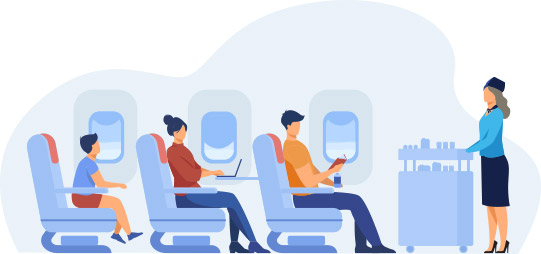Rules of conduct for passengers on board of an aircraft
According to Article 921 of the Air Code of the Republic of Uzbekistan (Newsletters of the Supreme Council of the Republic of Uzbekistan, 1993, No. 6, Article 247), passengers are obliged to observe the rules of conduct on board of an aircraft, comply with the orders of the aircraft captain or crew member made on behalf of the aircraft captain, to ensure flight safety and the safety of people on board of the aircraft, the preservation of property, order and ability to provide services related to the performance of the transportation contract.
The Aviation Administration of the Republic of Uzbekistan shall establish rules of passenger conduct on board of an aircraft.
* Registered by the Ministry of Justice of the Republic of Uzbekistan on 29 January 2013, registration number 2416.
Chapter I. General Provisions
1. In these Regulations, the following terms are used:
- passenger – a person who is or is to be transported on board of an aircraft according to an air transportation agreement;
- crew – captain of the aircraft, other members of the crew, and flight attendants.
2. These Regulations are applicable to all passengers transported by carriers of the Republic of Uzbekistan.
Chapter II. Passenger conduct on board of an aircraft
3. A passenger on board of an aircraft shall:
- Follow the orders of the captain or orders given by other crew members on behalf of the captain, with regard to flight and passenger safety on board of an aircraft, safety of the equipment, and services, related to the clauses of the air transportation agreement;
- take a seat in the aircraft cabin in accordance with the boarding pass, if necessary for flight safety purposes, in accordance with the instructions of the aircraft crew member;
- place hand luggage into specially allocated lockers;
- fasten the seat belts when the “fasten seat belt” sign is on and leave them fastened until it is switched off.
4. A passenger on board of an aircraft is prohibited to:
- use drugs, smoke tobacco products (nasvai - local tobacco product, etc.), and use electronic cigarettes;
- consume alcoholic beverages over the established norms offered by the carrier and alcoholic beverages purchased in duty-free shops;
- enter into the cockpit;
- prevent crew members of the aircraft from performing their duties or interfering with their actions;
- use electronic devices and means of communication during taxiing, take-off, and landing of the aircraft, as well as take photos and videos at all stages of the flight; (Paragraph 4, paragraph 6 in the edition of the Order of the Head of the State Inspectorate of the Republic of Uzbekistan on Safety Supervision dated 8 January 2016 № 67-n (reg. № 2416-1 dated 12 January 2016) Collection of Laws of the Republic of Uzbekistan, 2016, № 2, Art. 17);
- take away or damage aircraft equipment (blankets, cushions, dishes, cutlery, electronic devices, life jackets, etc.);
- disrupt public order and unnecessarily disturb others;
- use emergency equipment without special instructions from the aircraft crew;
- change seats without permission or request of the aircraft crew.
5. The air transportation agreement between the carrier and a passenger, can be terminated by the carrier at any point of the route if the passenger violates the requirements of the Rules of conduct on board of the aircraft, endangering flight safety or endangering the life or health of persons and their property.
Chapter III. Passenger rights
6. A passenger reserves the right to request crew members to provide services specified in the air transportation agreement.
7. A passenger has the right to seek assistance from crew members for sorting issues with other passengers who break social order and disturb others without reason, threatening their dignity, property, health or lives. A passenger can also complain about similar behavior of a member of the staff.
A passenger also has other rights provided for by law.
Chapter IV. Final Provisions
8. Persons guilty of violating the requirements of these rules shall be held liable in accordance with the legislation.

